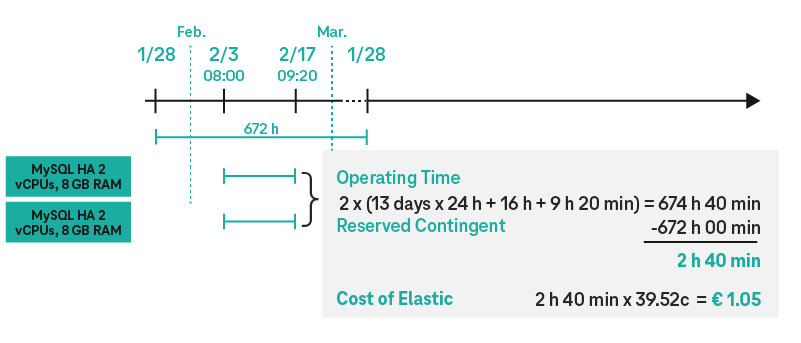With the Open Telekom Cloud, billing always occurs monthly.
Take advantage of our consulting services!
Our experts will be happy to help you.
Hotline: 24 hours a day, seven days a week

With the Open Telekom Cloud, billing always occurs monthly.
With this billing model, the services used are offset by any credit balance and free contingents (from reserved contracts). For the core offering of the Relational Database Service, in addition to hourly pay-as-you-go models, there are also reserved models available that offer users discounts of up to 60 percent on regular orders of resources over 12 or 24 months. Two discount models are available: monthly advance payments and prefinancing of the entire period (upfront). The upfront model offers the biggest discounts.
With this model, only the time in which the ordered instances are active is charged. A separate billing item is generated for each kind of RDS database: a Computing-I flavor with CentOS and a MySQL database with 2vCPU and 8 GB RAM and a MSSQL database with 2vCPU and 8 GB RAM are recorded separately. The runtime of each database is recorded every second and added up during the calendar month. The resulting total time is used for the billing. For databases, a distinction is made between HA and Single, and read replicas can also be used. For HA databases, the entire cluster is billed in one position. If you use DB instances only for routine development, you can temporarily stop pay-per-use instances to save money. You can stop an instance for up to seven days. After a RDS instance is stopped, only the compute resources CPU & RAM where the DB instance is located are no longer billed until the instance is running again. Other resources, including EIPs, storage resources, database proxies, and backups, are still billed. More information here.
Reserved instances are not available for all databases. The service description sets out the available instances. Reserved instances can be reserved for a period of 12 or 24 months. They are not fixed to a specific instance, but rather only to the instance type, and are billed even if the instance is inactive. Users acquire a credit balance corresponding to uninterrupted use of an instance of the selected type for the chosen period. This credit balance is spread over the individual months of the contract term (days of each month x 24 hours). The contract term always starts at midnight on the order date. If a reserved package is ordered, the usage in the first month is charged proportionately (only the remaining days of the month in which the order occurred are billed). The same is valid for the last month of the duration of the package. Reserved packages are not renewed automatically. If the instance is not used for the full month, the unused contingent for that month is forfeited; nor can it be used later in the reserved period. it is possible to use two instances for partial periods during a month instead of using one instance for the entire period. The use of capacities in excess of the ordered amount is billed on top according to the elastic model.
You reserve the instance MySQL HA 2 vCPUs, 8 GB RAM for a period of 12 months on January 28. From February 3, 8:00 AM to February 17, 9:20 AM you use two reserved instances simultaneously. Usage in excess of the monthly quota of 672 hours (2:40 hours) will be billed in elastic mode.

An upgrade to a larger instance type is possible at any time. The contract period remains unchanged. The billing of the previous period of the reserved package is done precisely to the day using the previous rate (daily rate of the monthly cost x expired days). The new package is valid until the originally agreed end of term and is also billed to the day. The upgrade must be ordered via the service desk.
The decisive factors for the costs of DCS are the main memory (RAM) and variant used (single node, master stand-by, cluster). With master stand-by, the user is provided with a high-availability service. If the Distributed Cache Service is configured as master stand-by, two instances are provided in technical terms but only one DCS item is listed on the bill. The hourly rate charged for using the service depends on the combination that is chosen.
RAM GB | Single Node per Hour | Master Stand-by per Hour | Cluster per Hour |
1 | 0.015 | 0.026 | |
2 | 0.035 | 0.062 | |
4 | 0.075 | 0.131 | |
8 | 0.190 | 0.332 | |
16 | 0.426 | 0.745 | |
32 | 0.654 | 1.144 | |
64 | 1.368 | 2.393 | 2.496 |
128 | 4.992 | ||
256 | 9.984 | ||
512 | 16.968 |
Overview of hourly costs for DCS
Data Ingestion Services uses four parameters for cost calculation. First, the actual monthly average data volume is charged; the total amount of data and duration are cost relevant. Additionally, like the object storage, requests generate costs. Requests are e.g., data package uploads or downloads. The number of requests is also related to the volume of a single data package. One request is counted per 25 KB. Thus, a 100 kB package results in four requests although it is only one package (the charge for 1 million requests is 2 cents). The fourth component for costs is the number of used partitions. Furthermore, DIS distinguishes between „general“ and „advanced“. The Data Warehouse Service is billed according to the used ECS in the respective price models (elastic/reserved).


The Open Telekom Cloud Community
This is where users, developers and product owners meet to help each other, share knowledge and discuss.
Free expert hotline
Our certified cloud experts provide you with personal service free of charge.
0800 3304477 (from Germany)
+800 33044770 (from abroad)
24 hours a day, seven days a week
Write an E-Mail
Our customer service is available free of charge via E-Mail
AIssistant Cloudia
Our AI-powered search helps with your cloud needs.